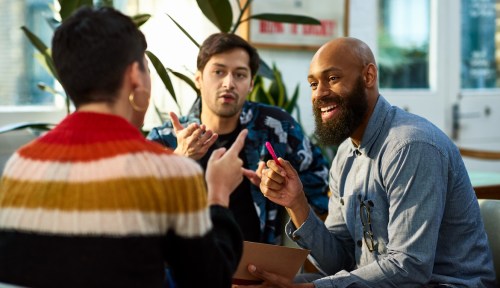Our editors independently select these products. Making a purchase through our links may earn Well+Good a commission
The 4 Magic Words for Getting Helpful Information From Others
No one who knows all the things, so we all stand to benefit from learning the best way for getting helpful information from others.

It’s really never too late to learn something new. Too often, though, we stop ourselves from learning new information and then growing from that information because we feel we should already be in the know or we simply don’t know how to learn the intel in question. While you can certainly take classes, watch a video, or read a book to acquire knowledge, though, one of the most effective ways to get helpful information from others is to simply ask.
Experts in This Article
author, educator, historian, and advocate. She is the creator of the viral web series Smarter in Seconds, co-owner of Fempower Beauty and Head of Education at FEMINIST.
founder of NAAYA, which roots people of color in their wellness
Remaining curious and asking for answers when you don’t have them were both topics of discussion in Well+Good’s recent Instagram Live event with Sinikiwe Dhliwayo, founder of Naaya, and Blair Imani, historian, activist, and author of Read This To Get Smarter: About Race, Class, Gender, Disability & More. During the chat, the two discussed the four magic words people can use to elicit answers from others: “I don’t know this.”
To listen to the full discussion, check out the whole Live below:
Admitting that you don’t know something isn’t anything to be afraid or ashamed of—especially when you come from a place of curiosity and willingness to learn. So instead of getting frustrated with yourself for not already knowing something, embrace the situation as an opportunity to learn something new.
“Being human means trying. It doesn’t mean having the solutions, but it sometimes means knowing what you’re working with and what you’re working on.” —Blair Imani, activist
“Being human means trying. It doesn’t mean having the solutions, but it sometimes means knowing what you’re working with and what you’re working on,” Imani said during the Live. “To be a human is to continue to learn, to continue to try, and to be comfortable in that discomfort” [of not knowing], she adds.
Of course, this doesn’t mean you get to just assume the answers to questions of which you’re unsure. Rather, Dhliwayo and Imani said it’s better to be intentional and ask about what you need to learn (respectfully, of course). “The point of teaching isn’t to give people the answers—it’s showing them how to ask better questions,” says Imani. That said, you also can’t expect that the person you’re asking has the energy to answer your question on your terms. After all, they don’t necessarily owe you those answers. And as for questions that relate to antiracism and other forms of fighting social inequity, it is every person’s own responsibility to work through the implicit biases they may carry—certainly not the responsibility of others who are already doing that work themselves.
So, when should you ask questions as your strategy for getting helpful information from others? One example Imani shared was asking someone for their pronouns. Because we can never assume someone’s pronouns, this presents a perfect opportunity to admit that you don’t know something. In terms of getting helpful information from others (in this case, how someone sees themselves as a human) asking a question, rather than making an assumption, is where you want to be, says Imani. But before asking someone else’s pronouns, consider sharing your own so as to not single anyone out, she added.
Ultimately, it’s more than okay not to know something—we can’t possibly know everything. So, we stand to benefit from not being so hard on ourselves when that’s the case. Instead, Dhilwayo and Imani encourage people to be patient with themselves and ask about what they don’t know all while keeping in mind that others have the right to guide you to the answers instead of simply providing the answers they worked hard to gain.
Oh hi! You look like someone who loves free workouts, discounts for cutting-edge wellness brands, and exclusive Well+Good content. Sign up for Well+, our online community of wellness insiders, and unlock your rewards instantly.










